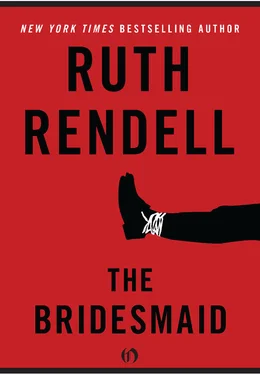Ruth Rendell - The Bridesmaid
Здесь есть возможность читать онлайн «Ruth Rendell - The Bridesmaid» весь текст электронной книги совершенно бесплатно (целиком полную версию без сокращений). В некоторых случаях можно слушать аудио, скачать через торрент в формате fb2 и присутствует краткое содержание. Год выпуска: 2010, Издательство: Open Road Integrated Media LLC, Жанр: Триллер, на английском языке. Описание произведения, (предисловие) а так же отзывы посетителей доступны на портале библиотеки ЛибКат.
- Название:The Bridesmaid
- Автор:
- Издательство:Open Road Integrated Media LLC
- Жанр:
- Год:2010
- ISBN:нет данных
- Рейтинг книги:3 / 5. Голосов: 1
-
Избранное:Добавить в избранное
- Отзывы:
-
Ваша оценка:
- 60
- 1
- 2
- 3
- 4
- 5
The Bridesmaid: краткое содержание, описание и аннотация
Предлагаем к чтению аннотацию, описание, краткое содержание или предисловие (зависит от того, что написал сам автор книги «The Bridesmaid»). Если вы не нашли необходимую информацию о книге — напишите в комментариях, мы постараемся отыскать её.
The Bridesmaid — читать онлайн бесплатно полную книгу (весь текст) целиком
Ниже представлен текст книги, разбитый по страницам. Система сохранения места последней прочитанной страницы, позволяет с удобством читать онлайн бесплатно книгу «The Bridesmaid», без необходимости каждый раз заново искать на чём Вы остановились. Поставьте закладку, и сможете в любой момент перейти на страницу, на которой закончили чтение.
Интервал:
Закладка:
The Bridesmaid
Ruth Rendell

For Don
Contents
CHAPTER ONE
CHAPTER TWO
CHAPTER THREE
CHAPTER FOUR
CHAPTER FIVE
CHAPTER SIX
CHAPTER SEVEN
CHAPTER EIGHT
CHAPTER NINE
CHAPTER TEN
CHAPTER ELEVEN
CHAPTER TWELVE
CHAPTER THIRTEEN
CHAPTER FOURTEEN
CHAPTER FIFTEEN
CHAPTER SIXTEEN
CHAPTER SEVENTEEN
CHAPTER EIGHTEEN
CHAPTER NINETEEN
CHAPTER TWENTY
CHAPTER TWENTY-ONE
CHAPTER ONE
Violent death fascinates people. It upset Philip. He had a phobia about it. Or that was what he called it to himself sometimes, a phobia for murder and all forms of killing, the wanton destruction of life in war, and its senseless destruction in accidents. Violence was repellant—in reality, on the screen, in books. He had felt like this for years, since he was a small child and other children pointed toy guns and played at death. When it had begun or what began it he didn’t know. A curious thing was that he wasn’t cowardly or squeamish, he was no more nor less frightened by it than anyone else. It was rather that unnatural death neither entertained him nor exercised a goulish attraction. His reaction was to shy away from it in whatever form it might be presented to him.
He knew this was unusual. He hid his phobia, or tried to hide it. When the others watched television, he watched it with them and he didn’t close his eyes. He had never got into the way of denouncing newspapers or novels. But the others knew and had no particular respect for his feelings. It didn’t stop them talking about Rebecca Neave.
Left to himself, Philip would have taken no interest in her disappearance, still less speculated about her. He would have turned off the set. Of course, he would probably have turned it off ten minutes before and avoided Northern Ireland, Iran, Angola, and a train crash in France as well as a missing girl. He would never have looked at the photograph of her pretty face, the smiling mouth and eyes screwed up against the sun, the hair blown by the wind.
Rebecca disappeared at about three on an autumn afternoon. Her sister spoke to her on the phone on Wednesday morning, and a man who was a friend of hers, a new friend who had been out with her just four times, phoned her at lunchtime on that day. That was the last time her voice was heard. A neighbor saw her leave the block of flats where she lived. She was wearing a bright green velvet tracksuit and white running shoes. That was the last anyone saw of her.
Fee said, when the girl’s face appeared on screen, “I was at school with her. I thought I knew the name. Rebecca Neave. I thought I’d heard it before.”
“I’ve never heard it. You’ve never had a friend called Rebecca.”
“She wasn’t a friend, Cheryl. There were three thousand of us at that school. I don’t suppose I even spoke to her.” Fee was staring intently at the screen while her brother made as conscious an effort not to look. He had picked up the newspaper and turned to an inside page where the Rebecca Neave story had not penetrated. “They must think she’s been murdered,” Fee said.
Rebecca’s mother appeared and made an appeal for news of her missing daughter. Rebecca was twenty-three. Her job was teaching ceramics to adult classes, but needing to supplement her income, she advertised her services as a baby-sitter and house-sitter. It seemed possible that someone had phoned in answer to her advertisement. Rebecca had made an appointment for that evening—and kept it. Or that was what her mother believed.
“Oh, the poor woman,” said Christine, coming in with coffee on a tray. “What she must be going through. I can just imagine how I’d feel if it was one of you.”
“Well, it’s not likely to be me,” said Philip, who was well-built though thin, and six feet two. He looked at his sisters. “Can I turn this off now?”
“You’re so squeamish. You can’t stand anything like that, can you?” Cheryl had a ferocious scowl she seldom bothered to restrain. “She may not have been murdered. Hundreds of people go missing every year.”
“There’ll be more to it than we know,” Fee said. “They wouldn’t make all this fuss if she’d just gone off. It’s funny, I remember her being in the same crafts group as I was for O Levels. They said she wanted to go on and be a teacher, and the rest of them thought it was funny because all they wanted was to get married. Go on, turn it off, Phil, if you want. There isn’t going to be any more about Rebecca anyway.”
“Why can’t they put nice things on the news?” said Christine. “You’d think they would be just as sensational. It can’t be that there aren’t any nice things, can it?”
“Disasters are news,” said Philip. “But it might be an idea to try your kind for a change. They could have a list of today’s rescues, all the people saved from drowning, all those who’d been in car crashes and didn’t get killed.” He added, on a more sombre note, “A list of kids who haven’t been abused and girls who’ve got away from attackers.”
He switched off the set. There was a positive pleasure in seeing the picture dwindle and swiftly vanish. Fee hadn’t gloated over Rebecca Neave’s disappearance, but speculation about it obviously interested her far more than discussing one of Christine’s “nice things” would have. He made a rather artificial effort to talk about something else.
“What time are we all supposed to be going out tomorrow?”
“That’s right, change the subject. That’s so like you, Phil.”
“He said to be there by about six.” Christine looked rather shyly at the girls and then back to Philip. “I want you all to come out into the garden a minute. Will you? I want to ask your advice.”
It was a small, bleak garden, best at this time of the day when the sun was setting and the shadows were long. A row of Leyland cypresses prevented the neighbours from seeing over the fence at the end. In the middle of the grass was a circular slab of concrete and on the concrete stood a birdbath and a statue, side by side. There was no moss growing on the concrete but weeds pushed their way through a split under the birdbath. Christine laid her hand on the statue’s head and gave it a little stroke in the way she might have caressed a child. She looked at her children in that apprehensive way she had, half-diffident, half-daring.
“What would you say if I said I’d like to give Flora to him for a present?”
Fee seldom hesitated, was invariably strong. “You can’t give people statues as present.”
“Why not, if they like them?” Christine had said. “He said he liked her and she’d look nice in his garden. He said she reminded him of me.”
Fee said, as if their mother hadn’t spoken, “You give people chocolates or a bottle of wine.”
“He brought me wine.” Christine said this in a wondering and gratified tone, as if taking a bottle of wine to the house of a woman you were having dinner with was exceptionally thoughtful and generous. She moved her hand along Flora’s marble shoulder. “She’s always reminded me of a bridesmaid. It’s the flowers, I expect.”
Philip had never looked closely at the marble girl before. Flora was just the statue which had stood by the pond in their garden at home ever since he could remember. His father, he had been told, had bought her while he and Christine were on their honeymoon. She stood about three feet high and was a copy in miniature of a Roman statue. In her left hand she held a sheaf of flowers; with the other she reached for the hem of her robe, lifting it away from her right ankle. Both her feet were on the ground yet she seemed to be walking or dancing some sedate measure. But it was her face which was particularly beautiful. Looking at her, Philip realised that generally he didn’t find the faces of ancient Greek or Roman statues attractive. Their heavy jaws and long, bridgeless noses gave them a forbidding look. Standards of beauty had changed perhaps. Or else it was something more delicate that appealed to him. But Flora’s face was how a beautiful living girl’s might be today—the cheekbones high, the chin round, the upper lip short, and the mouth the loveliest conjunction of tenderly folded lips. It was like a living girl’s but for the eyes. Flora’s eyes, extremely wide apart, seemed to gaze at far horizons with an expression remote and pagan.
Читать дальшеИнтервал:
Закладка:
Похожие книги на «The Bridesmaid»
Представляем Вашему вниманию похожие книги на «The Bridesmaid» списком для выбора. Мы отобрали схожую по названию и смыслу литературу в надежде предоставить читателям больше вариантов отыскать новые, интересные, ещё непрочитанные произведения.
Обсуждение, отзывы о книге «The Bridesmaid» и просто собственные мнения читателей. Оставьте ваши комментарии, напишите, что Вы думаете о произведении, его смысле или главных героях. Укажите что конкретно понравилось, а что нет, и почему Вы так считаете.











